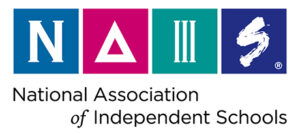by Meg Hansen, Director of Marketing and Communications
Third grade teacher Caroline Long is always looking for the next great adventure and thinking of ways she might weave it into an interesting lesson for her students. It’s just one of the things our students and parents love about Caroline and what makes her a great teacher.

Back in December, the great uncle of one of Caroline’s students shared something that sparked her interest. A 45-day expedition to Antarctica was about to take place and her students had the chance to be part of it. Through modern technology, a crew of scientists and marine exploration experts were allowing students around the world to track and interact with them via weekly video conferences as they boarded the S.A. Agulhas II on the Weddell Sea Expedition in Antarctica.
This program, offered through Reach the World, a nonprofit global education organization out of New York, connects schools with explorers and scientists around the world. It was the perfect segue to Caroline’s upcoming units on weather, explorers and other cultures. She started researching and even studied for a technical test she had to take over winter break in order to be considered for the program. She passed and she and her third graders were accepted into the program.
Caroline picked this particular expedition to share with her students for two reasons (with its connection to her curriculum):

- Environmental impact– The explorers were looking at the Larsen Sea ice shelf that broke off near the Weddell Sea in Antarctica in 2017. In particular, they were studying global warming’s effect on Antarctica and the broken ice shelf’s impact on water levels, the environment and the rich sea life that exists in this region. (Curriculum link: The class is studying weather and, in particular, they are looking at how climate change impacts weather and changes the overall climate in the U.S.)
- Finding the Endurance Shipwreck– Additionally, these explorers hope to use Autonomous Underwater Vehicles (AUV) to be the first to find Sir Ernest Shackleton’s ship Endurance, which was lost in an ice floe off Antarctica in 1915 and never found again. All members of Shackleton’s crew survived, but all missions to find the ship have failed. (Curriculum link: The class is studying explorers, namely the Spanish and French explorers who settled in Colorado, their country of origin, and what it took to travel all the way to Colorado.)

Caroline receives an email from the ship every Friday and on the following Monday the students learn of their assignment and plan their weeks around the call with a variety of experts on the expedition. Soon the students made connections with Holly, the main scientist on the ship, and began following her blog (many of our students used their time during Readers Workshop to read about the expedition). John Shears, one of the scientists on the ship, offered his thoughts on the expedition and the kids surprisingly learned that John won the Polar Medal from Her Majesty Queen Elizabeth II. Wow! The students began keeping logs of what they were learning, and a list of questions and what they wanted to learn from the explorers. They wanted to know a lot. For example:
- What makes this expedition different from Shackleton’s Endurance and what would happen if the SA. Agulhas II got stuck just like the Endurance?
- How on earth do they get all that safety equipment and people to Antarctica?
- How do planes stop when they are landing on a sheet of ice?
- What were the scientists learning about wildlife in Antarctica?
- What does Antarctica have to do with Mars?
- What are the explorers learning about other cultures since they are mostly just encountering animals?
- We know a lot about collaboration at Friends School, but why is collaboration in Antarctica so important?
- Tell us where flexibility, adaptability and unpredictability lessons were part of this expedition?
The answers are fascinating! See one of our third grader experts who would be happy to share answers to these questions and all they’ve learned about this project. (Teaser: You can’t touch or hug a penguin in Antarctica unless it’s on the runway, and NASA is studying Antarctica in the hopes it will help astronauts one day live on Mars.)
The students are particularly excited about their last video conference which will be a YouTube live stream with John Shears reflecting back on everything they learned on their voyage: has the climate changed and what are the effects, has the ice gotten thinner, and…did they find the Endurance? We can’t wait to find out!

It turns out modern-day explorers are all around us.You don’t have to go to Antarctica to be an explorer. Visits from two Friends alumni will bring modern-day expeditions right into the classroom. Phoebe Norman (Friends School Fifth Grade Class of 2011) visited 3rd grade last week, and Michael Hansen (Friends School Fifth Grade Class of 2007) will visit soon to share their own experiences of exploring the world and learning about new cultures. Through Where There Be Dragons, Phoebe went to Senegal and Guinea for three months and stayed with two different host families. She shared with the students about adapting to a new religion, living in different homes, eating/cooking different food in different ways, and learning new languages. The kids were all surprised to hear that in some places there wasn’t technology or access to WIFI and phones and that she was only able to communicate back home a few times via email. They loved seeing her pictures and learning about a new country and her experiences

as an explorer. Michael will be visiting the students in March to talk with them about his annual college trips to Argentina to study their culture and business economy. After graduating from college, he traveled to Tanzania to climb Mt. Kilimanjaro where he was immersed in the African culture and completed this expedition that was both physically and mentally challenging. There were challenges and surprises along the way and times where he needed to adjust the course of his travels. But all of them were worth it for the people he met, the places he saw, and some of the unidentifiably delicious food he ate.
Whether it’s Antarctica or Africa or just around our beautiful state, Caroline is always challenging her students to reach beyond their own cultures and learn more about our larger world. She hopes the Weddell Sea Expedition project and the real-life expeditions of their Friends classmates who walked our halls long ago spark a desire to continue to explore and discover new lands and cultures. It’s easy to search online for any place on earth these days. While technology can help us explore different lands and cultures, true exploration happens by actually physically traveling to lands near and far and immersing yourself in the culture.
Which one of our current third graders’ future expeditions will inspire the next generation of Friends students to explore our greater world?





